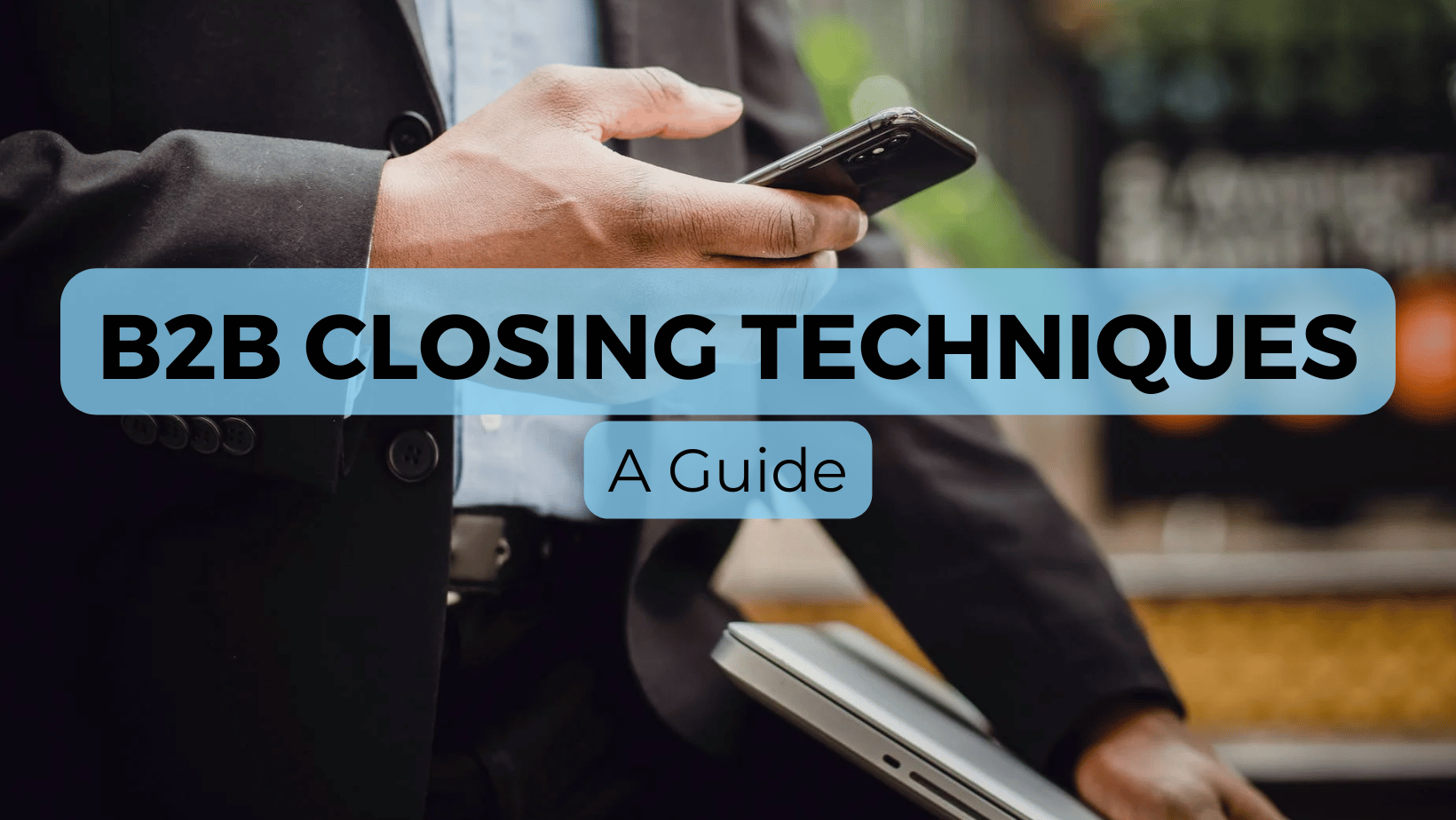B2B Closing Techniques: A Guide
If a prospect has made it to the final stages of the sales pipeline, it’s clear that they actually have an interest in, or a need for, what you’re selling. While that doesn’t make it easy to seal the deal, there are a range of B2B closing techniques that are proven to work well if combined with due diligence.
In today’s blog, we’ll be outlining some of those techniques, and breaking down what it means to negotiate effectively in the last few stages of the B2B sales pipeline.

Different Channels for Different Prospects
First thing’s first, though: the initial approach. Take time to consider the channel through which you should make first contact with a potential client, whether this is a formal and informative email, a more personable email, a phone call, a connection request on LinkedIn, or anything in between. The channel you go with should be the channel most suited to the prospect. For example, if you can see that the prospect is very active on LinkedIn, sending them a connection request may be more effective than sending them an email. This just depends, though; if a prospect hasn’t posted on LinkedIn for months, a connection request is unlikely to do much good. Sometimes a combination of both channels can be the way to go.
Emails can be effective as a means of first contact, as they give the prospect time to think about their decision before getting back to you. However, that can often be one of the reasons why approaching via email would fail to be effective; they don’t need to make a decision right away, so they don’t make a decision at all, and your email is forgotten.
Calling your prospect can often be an ideal option, especially if you’re giving them time to think about your product or service before making any kind of decision on it. That’s where setting up an appointment for later comes in handy.
When it comes to first contact with prospects, the best method tends to be picking one primary channel and then complimenting it with other channels. For example, phoning the prospect directly but also sending them the occasional email, or a connection request on LinkedIn.

B2B Closing Techniques: Probing Questions
When it comes to B2B closing techniques, one of the most critical would be the method known as probing questioning. It’s a way of uncovering a prospect’s motivations when it comes to making purchases, and is an ideal means of overcoming certain sales objections.
Probing questions are exactly what they sound like. You’re probing the prospect for more information. If, say, a B2B buyer turns down your initial offer because they’re after a better price, the next logical step would be to probe them by asking them what they actually mean when they say ‘better price’.

Make a List of Your Prospect’s Objections
Ask the prospect to help you put together a list of their objections. Once this list has been compiled, go over it with them to make sure nothing’s been left out. Then, simply make your way through the list and address each objection one at a time. If, once you’ve reached the end of their list, you’ve addressed all of their concerns, you’ll soon find out whether they’re actually interested in purchasing your product or service.
If it’s still a hard no, you can now hone in on what exactly is stopping the sale by simply asking them outright.

B2B Closing Techniques: Rhetorical Questions
Another proven B2B closing technique is asking rhetorical questions. These are best put to use in scenarios where asking a direct question would feel too informal, or in some cases outright offensive. You won’t quite be asking an actual question, but your prospect will still be perceiving it as a question, and will therefore give you the answer to the not-quite-question.
An example of this would be when you’re trying to determine a prospect’s purchasing objectives, in which instance you could say, “[Our product/service] will provide you with a good return on investment, which is what everyone’s looking for, isn’t it?”

Don’t Speak!
It may feel a little unnatural if you’re not used to using this technique, but it can actually be genuinely effective to go completely silent once you’ve asked for the sale outright. It doesn’t matter how long it takes (unless the sun’s come up)- stay quiet, and don’t talk until the prospect talks.
This technique can take some getting used to, but it’s very often worth a shot.

B2B Closing Techniques: Leading Questions
To help a prospect gain a clearer picture of what you’re actually offering them, it can be helpful to ask leading questions. This would be most effective in situations where it seems like your prospect is losing interest in your product/service, or in situations where they didn’t seem all that interested from the start.
This can be as simple as turning a statement about the benefits of your product or service into a question.

B2B Closing Techniques: Focused Questions
This type of questioning is also known as ‘funnel’ questioning. They’re questions used to narrow down your focus to specific areas of concern. They’re referred to as ‘funnel’ questions because they involve a chain of questions, each more probing than the last.
For example, if you’re offering a product even though your prospect may already own a competitor’s product, ask them if they’re currently using the type of product you’re selling. If they say they are, ask them which product they’re using. Once they’ve answered, ask them about any potential problems they may be having with said product- problems that could be solved by switching to your own.

B2B Closing Techniques: Hypothetical Questions
Also known as ‘what if?’ questions, this closing technique allows your prospect to visualise situations their business may experience at some point in the future.
Often, these types of questions can be the thing that makes the prospect realise they will indeed need your product or service at some point, even if they don’t need it right away.

Ryan Whyte is the Senior Campaign Manager where he leads a team of B2B telemarketers to deliver high-quality leads for clients. With a strong background in campaign management and a focus on driving results, Ryan is dedicated to optimising strategies that maximise client success in B2B lead generation.



















